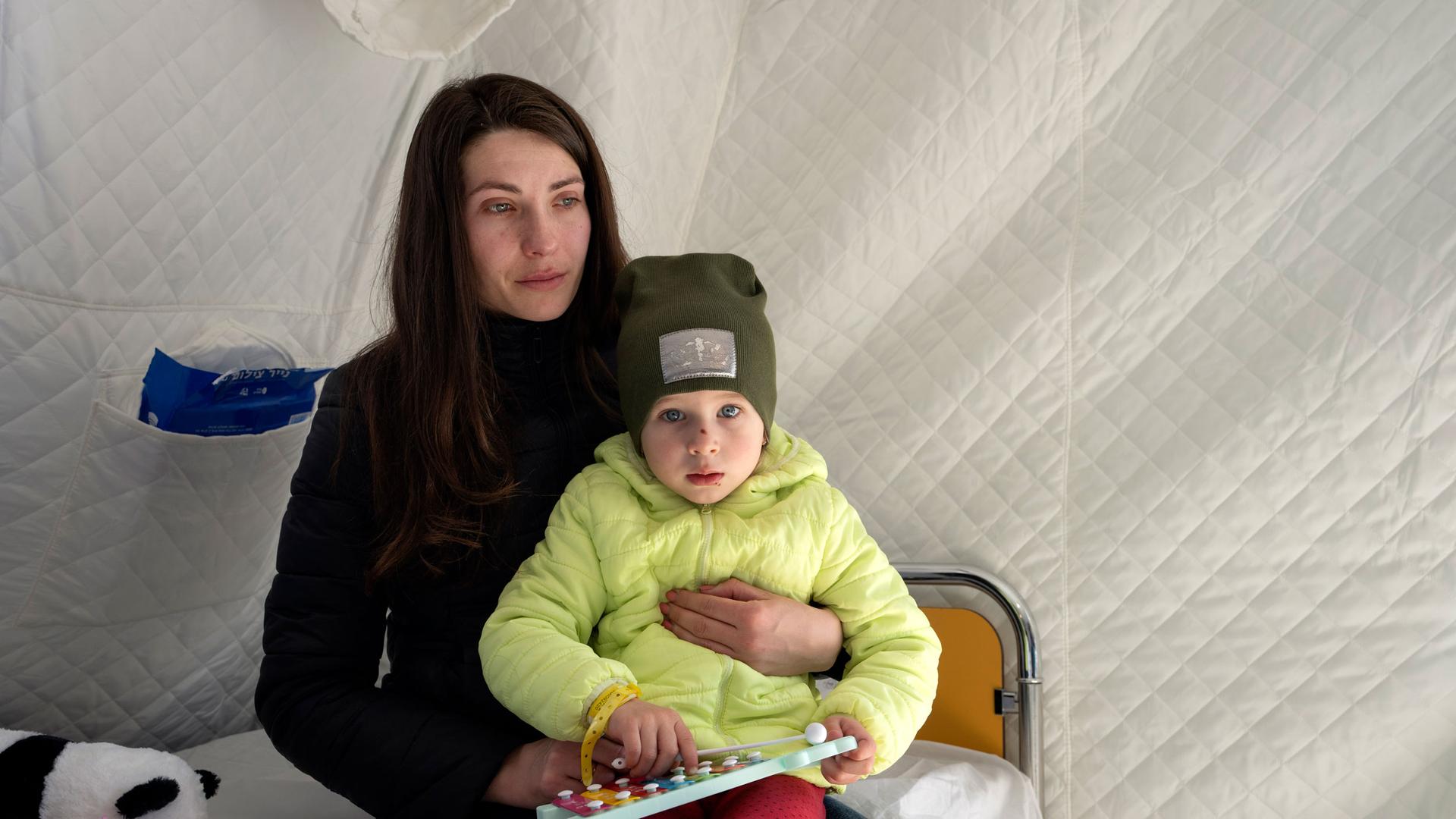Last fall, a rare polio outbreak began in western Ukraine. A vaccination campaign in Ukraine kicked off on Feb. 14. But just 10 days later, Russia invaded Ukraine — imperiling the campaign’s success. After the initial outbreak, officials found 19 other people who tested as having had polio — a deadly disease that can lead to paralysis.
“In a number of regions, vaccinations have now been suspended mostly because of shelling and rocket assaults,” said Ihor Kuzin, Ukraine’s deputy health minister.
Kuzin also said that recent attacks on the electrical grid have made it difficult to store vaccines in proper refrigeration so they don’t spoil. Transporting spoiled vaccines is also a challenge because the war has made it impossible to carry them by plane.
But one of the biggest worries for health officials attempting to manage the polio outbreak during the war is the millions of people — many with young children — who haven’t completed a full polio vaccination and then, migrated internally within Ukraine to seek safety, or sought refuge elsewhere in Europe.
“One challenging thing about polio is the fact that 90% [of people] are asymptomatic carriers; these are individuals that would not come down with paralysis but they can shed the virus,” said Raymond Dankoli, the World Health Organization’s polio outbreak response coordinator in Ukraine.

A rare outbreak
Early last winter, Ukrainian parents were filing into health clinics in central Ukraine to vaccinate their children against polio, a process that takes only seconds.
The oral polio vaccine has been instrumental in stopping the global spread of polio. But that same lifesaving vaccine has also been linked to a global uptick in polio outbreaks. Oral polio vaccines contain a weakened strain of the virus. And in rare instances, especially among high numbers of unvaccinated people, the weakened virus in the vaccine can mutate and start circulating, causing a polio outbreak.
The vaccine-derived polio outbreak began in western Ukraine last fall when a 17-month-old girl in the Rivne region was diagnosed with acute flaccid paralysis — a rare but debilitating side effect of polio. A second case of paralytic polio was discovered soon after in a boy who lived in the Zakarpattya region.
The two cases occurred in regions of western Ukraine that don’t even border each other, underscoring the severity of the situation. With polio, just one case is considered an outbreak because the disease is targeted for global eradication. Unlike COVID-19, which might circulate forever, polio can be completely contained if enough people are vaccinated.

‘Let’s wait until we go home’
Deputy Health Minister Kuzin said that many Ukrainians are hesitant to make unnecessary trips to a hospital or health clinic — given that an air raid siren might go off at any time. He also said that the government has begun dispatching mobile brigades in some parts of Ukraine to deliver vaccines.
Dankoli, with the World Health Organization, said that the war could cause polio to spread further around Ukraine or elsewhere in Europe or beyond.
A lot of Ukrainians who’ve fled home with their kids could get them vaccinated elsewhere. But many are choosing to wait.
That’s according to Pavlo Kovtonyuk, co-founder of the Ukrainian Healthcare Center and the former deputy health minister of Ukraine.
“The attitude is ‘let’s wait until we go home and we’ll go to our doctor.’ They just postpone receiving care, not just for vaccinations but also chronic issues,” Kovtonyuk said.
In his previous position, Kovtonyuk helped to usher in major reforms aimed at improving the country’s health system, reducing corruption and creating more equitable and affordable access to health care.
Kovtonyuk said that when he set out to launch these reforms, Ukraine was a very vaccine-hesitant country. In 2015, the number of children under 1 year of age who received the polio vaccine was less than 17%. The ministry launched special campaigns to increase vaccination rates, and the reforms improved patients’ trust in the medical system, in part, because they allowed them to choose their own doctors. Gradually, faith in the medicine system improved, he said, and more Ukrainains got vaccinated for diseases like polio.
“We managed to get vaccination levels to an average of 80% of the population, which is good compared to what it was before, but not sufficient because for a vaccine like polio, you need 95%,” Kovtonyuk said.
Progress made in increasing the number of vaccinations in Ukraine started to level off during the pandemic, with the number of vaccines given for some diseases, like polio, even decreasing, according to data from the Ukraine’s Health Ministry.
One reason vaccination rates started to decrease, according to experts, might be partially linked to Russian propaganda about COVID-19 vaccines.
Liubomyr Mysiv, the deputy director of the Ukrainian research group Rating, said Russian propaganda convinced some Russian speakers in Ukraine that Russian vaccines against COVID-19 are safer than Western ones.
“It’s hard not to succumb to this propaganda, because it’s very well-made and it plays into people’s fears,” Mysiv said.
Fears about getting a COVID-19 vaccine could convince some to forgo getting other vaccines. But Mysiv said that his organization’s research shows that the majority of Ukrainians now view vaccines favorably.
As the war continues, attacks on Ukraine’s health care infrastructure will continue to impede the vaccine campaign against polio. Kovtonyuk, of the Ukrainian Healthcare Center, has documented 223 Russian attacks on Ukrainian health care facilities.
“Russia is using health care as a means of war,” Kovtonyuk said.
The current estimate of Ukrainian babies under 1 year old who got vaccinated against polio this year has fallen to less than 50%, which means that so far, the war has erased the huge gains that were made in stopping the spread of polio in Ukraine.
